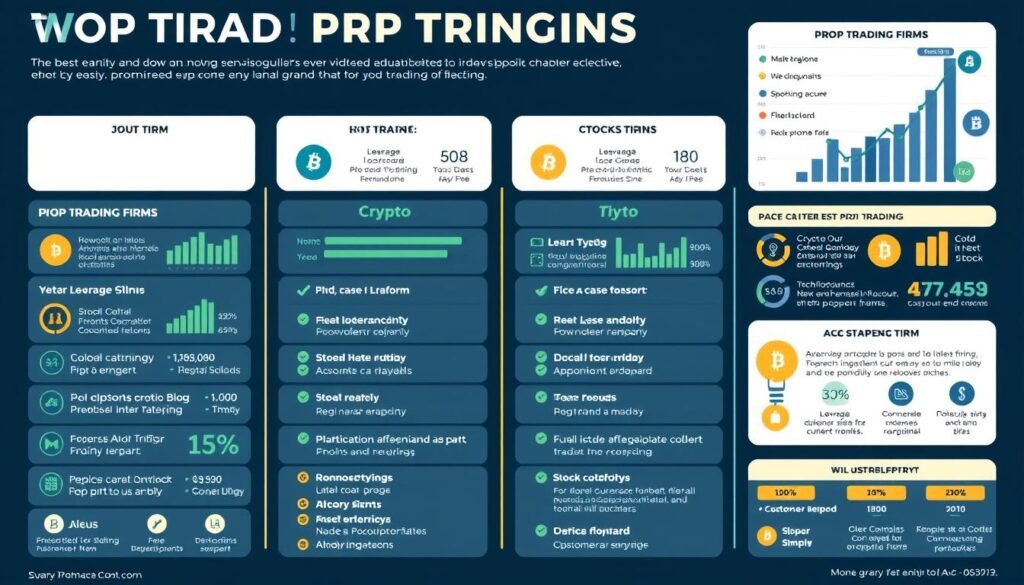In today’s world, financial markets are full of chances. You might ask if Proprietary trading includes trading in cryptocurrencies and stocks. Can You Trade Crypto and Stocks in Prop Firms, exploring the complex world of Financial markets trading? This guide aims to reveal the possibilities for traders wanting to mix the ups and downs of crypto with the stability of stocks in prop firms.
Proprietary trading is always on the edge, adapting to new financial tools. With more traders wanting diverse portfolios, the question remains: Can these firms handle both crypto and stocks? The mix of these two in prop firms opens up a new area for traders. Let’s look into how to work with both asset types in prop trading.
Key Takeaways
- Examination of proprietary trading as a gateway for trading both cryptocurrencies and traditional stocks
- Insight into how prop firms are adapting to the duo of modern and conventional asset classes
- Understanding of the scope and capability of prop firms in managing diverse trading portfolios
- Exploration of the complexities and possibilities inherent in the cross-trade dynamics of crypto and stocks
- Guidance on navigating the prop trading landscape as it expands to include a wider range of financial markets
Understanding Proprietary Trading Firms
In the fast-paced world of finance, Proprietary trading firms, or ‘prop trading firms,’ are unique. They trade with their own money, not with clients. This lets them take big risks and possibly earn big rewards.
What are Prop Trading Firms?
Prop trading firms trade financial assets and take all the risks and profits. They use advanced tech and strategies to make money. Unlike regular brokerages, they don’t deal with clients, making their business model different.
The Evolution of Prop Firms in the Financial Market
The world of prop trading has changed a lot over the years, thanks to technology. At first, they relied on manual trades and simple strategies. But with the rise of algorithmic trading and other advanced methods, they’ve changed a lot.
Now, prop trading firms use the latest tech and algorithms. This lets them make fast, accurate trades. It also helps them avoid mistakes, making them better in the competitive market.
Here’s how technology has changed prop trading firms:
| Year | Technology Introduced | Impact on Proprietary Trading |
|---|---|---|
| 1990s | Electronic Trading Platforms | Enabled rapid execution of trades, improving transaction speeds. |
| Early 2000s | Algorithmic Trading Systems | Enhanced the ability to analyze vast datasets, optimizing trading strategies. |
| 2010s | Artificial Intelligence & Machine Learning | Allowed for predictive analytics and automated decision-making, significantly reducing risks. |
| Recent Years | Blockchain Technology | Introduced new assets like cryptocurrencies, expanding market opportunities. |
Exploring the Basics of Prop Trading Crypto
Cryptocurrencies have changed how trading firms work. They offer new chances and challenges for traders. It’s key to know how these digital assets work in trading setups.
How Does Cryptocurrency Fit into Prop Trading?
Prop trading crypto means firms trade with their own money for profit. Cryptocurrencies are very volatile, which makes them appealing for quick gains. Trading cryptocurrencies needs a good grasp of market trends and rules.
Risks and Rewards of Crypto Trading in Prop Firms
The world of prop trading crypto is full of risks and rewards. The volatility that attracts traders can also cause big losses. So, firms must have strong risk management to protect their money.
| Risk Factor | Potential Reward | Management Strategy |
|---|---|---|
| High market volatility | High return potential on short-term trades | Dynamic stop-loss limits |
| Regulatory changes | Early adoption advantage in new markets | Continuous compliance monitoring |
| 24/7 market operation | Opportunities to profit from market at all hours | Deployment of automated trading systems |
Knowing the risks and rewards of prop trading crypto is vital. It helps traders make smart choices based on their risk level and goals.
Trading Stocks with Proprietary Firms
Proprietary firms are big in the financial markets. They help traders use stock trading strategies that are smart and bold. These strategies use the firm’s money, so traders don’t risk their own cash.
Prop trading stocks use many methods, like swing trading and arbitrage. These are chosen based on the market. Prop firms give traders great tools and platforms to work with.
Stock Trading Strategies in Prop Firms
Traders in these firms use many strategies. They do day trading, holding stocks for just hours. They also do position trading, holding stocks for weeks or months to catch market trends. This way, they can handle different market levels and cycles well.
Comparison: Stock Trading vs. Crypto Trading in Prop Firms
Stock trading and crypto trading are different in prop firms. Stock trading uses old-school risk management and analysis. Crypto trading, on the other hand, is riskier but can offer quick profits. The rules for stock markets are stricter, making them safer than crypto.
Knowing these differences helps traders in prop firms make smart choices. They can pick their markets and strategies based on their comfort with risk. Prop firms use advanced tech and tools to help traders in both stock and crypto markets.
Can You Trade Crypto and Stocks in Prop Firms?
The financial world is changing fast. Proprietary trading firms now let you trade both cryptocurrencies and stocks. This means you can diversify your investments and aim for better returns.
These firms used to focus on stocks but now also offer crypto trading. This shift has created new chances for traders who know their markets well. Trading both assets in prop firms is now common and possible.

These firms give you an edge with advanced trading tools. They help you make quick trades in both stock and crypto markets. You also get to use more capital and learn from experienced traders.
But, trading in prop firms needs a deep understanding of different markets and rules. Stocks are regulated by bodies like the SEC. But, crypto trading deals with changing rules, making it unique.
- Ample capital to withstand market fluctuations
- Enhanced trading tools and analytics
- Collaborative environment providing insights from various experienced traders
In short, trading crypto and stocks in prop firms is definitely an option. The market trends and how prop firms have grown support this. Trading both assets can lead to more profits and fits with the trend of diversifying and getting smarter in trading.
Eligibility Criteria for Traders in Prop Firms
The entry criteria for top prop trading firms are strict. This shows the big risks in trading stocks and trading cryptocurrencies. To get in, you need to show you know the markets well and can handle the stress of trading.
Here are some key things that prop trading firms look for:
- Education: A degree in finance, economics, or something similar is often needed, but not always.
- Trading Experience: Being able to show you’ve traded before, in stocks, forex, or crypto, is very important.
- Licensing: You might need special trading licenses, depending on where you live.
- Trading Competency: You need to have done well in trading, either in real life or in practice tests.
| Criteria | Details | Example of Proof |
|---|---|---|
| Education | Relevant degree in finance, economics, or similar | Degree certificate, Transcripts |
| Trading Experience | Experience in financial markets | Trade logs, Brokerage statements |
| Licensing | Required trading licenses | SEC, FINRA licenses |
| Trading Competency | Demonstrated success in trading environments | Simulated trading results, Historical profit and loss statements |
Before applying to a prop trading firm, get ready well. This means having all your documents ready and improving your trading skills. It’s also good to keep up with the latest in trading stocks and trading cryptocurrencies.
Profit Sharing in Prop Trading: Crypto and Stocks
Profit-sharing in proprietary trading firms is key to attracting top talent. We’ll look at how profits are split and strategies for earning more.
How Profits are Split in Prop Trading
Profit-sharing agreements are vital in prop trading. They usually give traders a big share of their profits. The exact percentage depends on experience, risk, and market conditions.
Maximizing Your Earnings with Prop Firms
To make the most of prop trading, you need to understand profit-sharing. Traders who perform well and manage risk well earn more. Staying updated with market trends is also important.
| Experience Level | Typical Profit Share | Notes |
|---|---|---|
| Beginner | 25%-35% | Lower percentage due to higher risk and need for oversight. |
| Intermediate | 35%-50% | Increased share reflects growing expertise and lower risk. |
| Advanced | 50%-70% | High percentage for independent trading and strong profit records. |
Knowing about profit-sharing is essential for prop trading. A good partnership can bring big financial rewards for both sides.
Understanding the Risks Involved in Prop Trading
In the world of proprietary trading, knowing and managing risk is key to success. Proprietary trading firms use bold financial strategies. They need deep market knowledge and strong risk management to protect their money.
Managing Risk in Prop Trading
Risk management is vital for success in proprietary trading. Traders must create detailed risk plans and use tools to watch and control losses. They also need to stay alert to market changes and diversify to reduce risks.
Common Pitfalls in Prop Trading and How to Avoid Them
The high-risk world of proprietary trading can lead to big gains, but there are many traps. Over-leveraging, ignoring risk rules, and trading based on emotions are common mistakes. Knowing and sticking to trading plans can help avoid these pitfalls.
| Common Pitfall | Consequence | Prevention Strategy |
|---|---|---|
| Over-leveraging | Increased risk of substantial losses | Implement strict leverage ratios |
| Neglect of risk management systems | Potential for unchecked losses | Regular review and adherence to risk controls |
| Emotional trading | Erratic trading decisions | Application of algorithmic trading techniques |
Tools and Platforms for Prop Trading Crypto and Stocks
The world of proprietary trading has changed a lot. Now, prop trading tools are more important than ever. They help traders work better and stay ahead in fast markets like crypto and stocks.
Software Used by Prop Traders
Today’s prop trading firms use advanced software. This software helps with trading and understanding the market. It includes tools for analyzing trends and how well traders do.
With this software, traders make better choices. They use data to find the best ways to make money.
Automated Trading and Algorithmic Strategies in Prop Firms
Automated trading and algorithms have changed prop firms. These tools let traders use complex algorithms to analyze lots of data fast. This way, traders can use smart strategies in different markets with less manual work.
Using algorithms makes trading faster and safer. It also helps traders avoid mistakes. By automating some tasks, traders can spend more time on strategy and less on the details of trading.
For traders, automated trading systems are key. They help make quick, smart decisions in the fast and unpredictable markets of crypto and stocks. These systems make trading easier and more efficient.
Prop Trading Firms Regulations and Compliance
Prop trading firms need a strong framework to operate fairly and transparently. This part explores how these firms deal with complex laws. It also looks at the rules they must follow, especially for trading in crypto and stocks.
The Legal Landscape of Prop Trading
Prop trading firms face strict rules to keep the market honest and protect investors. The U.S. Securities and Exchange Commission (SEC) and the Commodity Futures Trading Commission (CFTC) are key in setting these rules. It’s vital for firms to follow these laws to stay legal and keep operating.
How Regulations Affect Crypto and Stock Trading in Prop Firms
Regulations change how prop trading firms handle crypto and stocks. These rules affect their trading plans, how they manage risks, and their overall setup. For example, stricter rules on fighting money laundering and better cybersecurity are key for trading digital assets.
| Regulatory Body | Focus Area | Impact on Prop Trading Firms |
|---|---|---|
| SEC | Securities Oversight | Enforces compliance on trading practices and disclosure requirements. |
| CFTC | Commodities and Futures | Regulates the derivatives markets, impacting strategies in prop trading firms. |
| FINRA | Broker-Dealer Regulation | Oversees brokerage activities and trading integrity. |
| FATF | Anti-Money Laundering | Sets international standards for combating financial crimes, affecting crypto trading. |
Education and Training for Prop Trading
Starting your journey as a prop trader means diving into prop trading education and training for prop trading. This step is key. It helps you understand the market better and learn how to trade well.
Prop trading firms offer special educational programs. These programs mix theory with practical skills. They help both new and experienced traders learn about market strategies, managing risks, and trading psychology.
- Initial Training: You’ll learn about financial markets, instruments, and what affects market movements.
- Advanced Simulation: You practice in a simulated environment that feels like real trading but without risk.
- Mentorship Programs: Experienced traders guide new ones, sharing their knowledge and experience.
- Ongoing Education: You’ll keep learning about new technologies, regulations, and market changes.
Choosing the right proprietary firm is key for those aiming high in prop trading. The quality of training for prop trading you get depends on the firm. The support and resources you have can greatly help you in the complex markets.
The prop trading education goes beyond just trading tactics. It also teaches about compliance and ethical trading. These are vital for success and integrity in trading.
In summary, with the right prop trading education and training for prop trading, you can boost your chances of success. These programs are essential in the world of proprietary trading.
Career Opportunities in Prop Trading Firms
The world of proprietary trading offers a wide range of career opportunities for those interested in finance. Prop trading firms are known for their dynamic work environment and the chance for high earnings. This makes them a great place for growth and development in many roles.
There are many careers in prop trading firms. Traders buy and sell assets, while risk managers make sure trades follow rules and keep the firm’s risk level in check. The firms also need IT professionals and system developers to create and update trading software and systems.
- Trader (Equities, Forex, Commodities, Cryptocurrency)
- Risk Management Analyst
- Financial Analyst
- Software Developer (focused on trading platforms)
- Data Scientist
There are also chances for career growth and role changes. For those looking into career opportunities in prop trading firms, moving from technical to strategic roles is possible. This could mean becoming a fund manager or chief risk officer, depending on your goals and the company’s needs.
Many start as junior traders or analysts and can become partners or start their own trading desks. This is if they show strong performance and understand the market well.
| Role | Primary Responsibilities | Required Skills |
|---|---|---|
| Trader | Execute trades, develop strategies | Analytical thinking, risk management |
| Risk Manager | Monitor exposure, enforce risk framework | Detail-oriented, problem-solving |
| Software Developer | Develop and maintain trading software | Programming, system design |
| Data Scientist | Analyze market data, create predictive models | Statistical analysis, machine learning |
The career opportunities in prop trading firms are not just for finance experts. They also welcome those skilled in technology, data analysis, and software development. This shows how diverse and modern proprietary trading has become.
Comparison of Prop Trading Firms: Features and Services
When looking at Prop Trading Firms for Trading Stocks or Trading Cryptocurrencies, it’s key to know what they offer. Each firm has its own way of supporting traders. Important features like technology, account types, market access, and support are crucial for success.

Let’s break down the main points to consider when picking a firm for trading stocks or trading cryptocurrencies:
| Feature | Prop Trading Firm A | Prop Trading Firm B | Prop Trading Firm C |
|---|---|---|---|
| Technology | Advanced charting tools | Basic analytics software | Custom built trading platform |
| Account Types | Standard, Pro, VIP | Standard, Premium | One-size fits all |
| Market Access | Global Markets | US and Europe | US only |
| Support Services | 24/7 customer service, On-site training | Email support, Monthly webinars | 24/7 chat support |
Choosing the right prop trading firm depends on your trading needs and preferences. Whether you focus on trading cryptocurrencies or stocks, these firms offer specific services to help you succeed. It’s important to carefully look at what each firm offers in terms of technology, access, and support. The best firm should match your trading style and help you execute your strategies well.
How to Choose the Right Prop Firm for Trading Crypto and Stocks
Choosing the right proprietary trading firm is a big decision. It’s especially important when you trade both cryptocurrencies and stocks. First, check the firm’s reputation carefully. A good reputation means the firm is reliable and safe for your trades.
Look at reviews and testimonials from other traders. This will help you understand if the firm is trustworthy.
Prop firms with the latest technology are a big plus. The right firm should have advanced trading platforms and tools. These should work smoothly with the markets, helping you trade efficiently.
Also, make sure the firm offers strong support. This includes educational resources, mentorship, and customer service. A firm that supports its traders is one that cares about its community.
Don’t forget to check the firm’s financial stability. A firm with solid finances shows it can handle your money well. It also means the firm can handle market ups and downs, which is crucial for trading crypto and stocks.
By looking at reputation, technology, support, and finances, you’ll find a firm that fits your needs. This way, you can focus on trading without worries.












